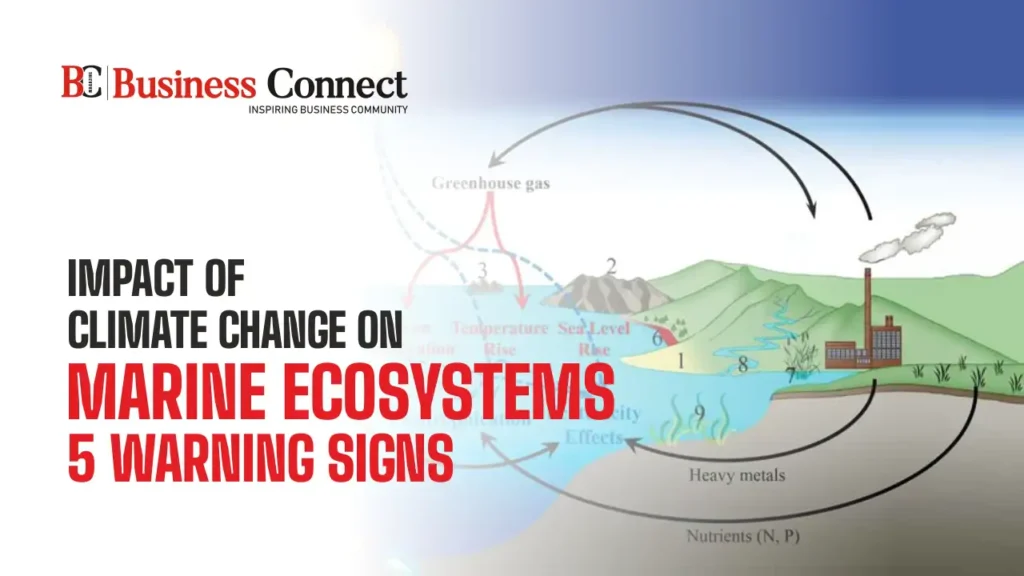Impact of Climate Change on Marine Ecosystems || 5 Warning Signs
The significance of marine ecosystems can be understood from the fact that oceans encompass more than 70% of the Earth’s surface. Besides having a major effect on heat transfer and precipitation, seas house a varied range of marine creatures.
Oceans are a crucial part of our climate regulation, but how healthy are our oceans today and what is the impact of climate change on marine ecosystems? Explore this post to find some of the ways that climate change has devasting effects on the world’s oceans and seas, and their inhabitants.
5 Way Climate Change Affects Marine Ecosystems
- Warm Oceans
One of the major impacts of climate change on marine ecosystems is visible in marine life, it is leading to disrupted ecosystems, behaviour changes and reduction in the reproduction of sea life. The issue has become more severe because of intense heatwaves in marine. It resulted in mass die-offs in species including coral reefs. According to WWF, the world has lost half of the reefs over the past 30 years. As per the UN Environment Programme, by the end of the century, the world’s coral reefs are heating at current rates.
- Melting Ice
When it comes to exploring the impact of climate change on marine ecosystems, the melting of sea ice in Arctic and Antarctic regions is a consequence of a warming planet.
The image of hungry polar bears often goes viral. Polar bears are hungry because, as these regions are melting, they have limited areas for hunting and finding food. The issue of food scarcity is also applicable to other creatures including penguins, seals, and walruses to name a few.
- Oxygen Levels in Oceans
The balance of oxygen generation throughout photosynthesis, air-sea exchange, and temperature-controlled solubility control the oxygen level in oceans. However, warmer and more stratified oceans generally carry less oxygen due to the impact of reduced gas solubility and raised respiration of organic matter due to better physical separation in subsurface waters.
- Changes in Ocean Currents
The interconnectedness in the ocean means, that a small change in the temperature can result not in major changes in the big wave of changes in currents. It disrupts marine migration and the entire ecosystem. Because of the shifting food chain, spices have to suffer in finding food. The major impacts of climate change on marine ecosystems such as changes in ocean currents can happen due to the changes in temperature, wind patterns and the sea ice melt.
The change in current affects the food chain and the distribution of plankton and other organism. It makes it tougher for marine creatures to find a way to breeding and feeding grounds.
- Irregularity in Weather Conditions
The weather conditions are getting irregular due to the impact of climate change on marine ecosystems. It results in intense storms, cyclones, hurricanes, and other extreme weather conditions that badly affect the habitats and life cycles.
Due to cyclones, rainwater goes to the oceans and affects corals. Hurricanes and cyclones shake the ocean water when they go to shores, it ultimately moves sands and muddy shallow water and blocks the sunlight on which coles and other sea creatures are depended for living.
These are the 5 impacts of climate change on marine ecosystems. Hopefully, you have a better understanding of how humans live and how this growth is affecting the ocean’s lives. Check out the below frequently asked questions related to climate change and their effect on ocean biodiversity.
How does climate change affect marine ecosystems?
Warming oceans, rising sea levels, floods, and acidification are some of the major examples of understanding the impact of climate change on marine ecosystems.
How does climate change affect the aquatic ecosystem?
Carbon dioxide emissions result in ocean acidification that decreases the availability of calcium carbonate for organisms. It makes it tougher for molluscs, coral and other organisms to create and continuously maintain the structural integrity of shells.
What affects the marine ecosystem?
The increasing pollution, urban development, harvesting, and most climate changes are mostly affecting the marine ecosystem.
How does temperature affect biodiversity in the ocean?
Because of the increasing temperature, sea oxygen levels go down which brings adverse effects on habitats and creatures living in oceans.
Must Read:



